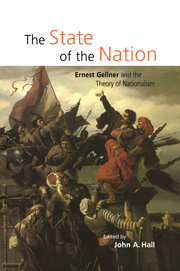Book contents
- Frontmatter
- Contents
- List of contributors
- Introduction
- Part I The making of the theory
- Part II The classical criticisms
- 3 Real and constructed: the nature of the nation
- 4 The curse of rurality: limits of modernisation theory
- 5 Nationalism and language: a post-Soviet perspective
- 6 Ernest Gellner's theory of nationalism: some definitional and methodological issues
- Part III Bringing politics back in
- Part IV Wider implications
- Bibliography of Ernest Gellner's writings on nationalism
- Index
3 - Real and constructed: the nature of the nation
Published online by Cambridge University Press: 05 December 2011
- Frontmatter
- Contents
- List of contributors
- Introduction
- Part I The making of the theory
- Part II The classical criticisms
- 3 Real and constructed: the nature of the nation
- 4 The curse of rurality: limits of modernisation theory
- 5 Nationalism and language: a post-Soviet perspective
- 6 Ernest Gellner's theory of nationalism: some definitional and methodological issues
- Part III Bringing politics back in
- Part IV Wider implications
- Bibliography of Ernest Gellner's writings on nationalism
- Index
Summary
When, thirty years ago, I began to write my book about the social composition of the leaders of national movements, it was not my intention to present a ‘theory’ of the origins of nations. My aim was far more modest: to determine just which social circumstances were favourable for the successful spread of national consciousness among the broad mass of the population – in other words the conditions for the success of those activities which I grouped together under the term ‘national agitation’. At the same time I hoped to clarify the place of the Czech ‘national revival’ in the European context. If I had any ambitions beyond the realm of empirical research, these lay in the field of methods rather than theory: I tried to demonstrate the utility of comparative methods at a time when their use was not yet a commonplace in European (and even less in Czech) historiography. I also aimed to investigate the possibilities of quantification as a modified form of ‘Namierism’.
In order to apply comparative methods, it was first necessary to select an approach which would exclude voluntarism and above all avoid the error of attempting to compare things that are not comparable. Therefore it was necessary to define the subject of comparison (the ‘nation’ or ‘nationality’) and to choose a set of processes involved in the formation of nations that have enough features in common so as to be brought together under a single type.
- Type
- Chapter
- Information
- The State of the NationErnest Gellner and the Theory of Nationalism, pp. 91 - 106Publisher: Cambridge University PressPrint publication year: 1998
- 12
- Cited by



